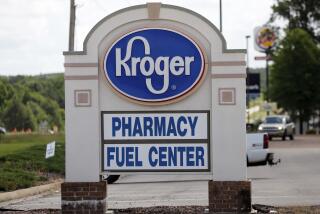Johnson & Johnson, Arthritis Group Settle Deceptive-Marketing Charges
- Share via
Johnson & Johnson and the Arthritis Foundation on Wednesday settled charges that they deceptively marketed a line of over-the-counter pain relievers.
The pharmaceutical company agreed to pay $2 million to a federal health agency and 19 states as part of the settlement. The Arthritis Foundation was not fined.
For the record:
12:00 a.m. Oct. 18, 1996 For the Record
Los Angeles Times Friday October 18, 1996 Home Edition Business Part D Page 2 Financial Desk 2 inches; 56 words Type of Material: Correction
Nicotine patch--Because of an editing error, a story in Thursday’s editions misstated when a law enforcement official will review upcoming ads for SmithKline Beecham’s nicotine patch, which has a marketing tie-in with the American Cancer Society. Senior Assistant California Atty. Gen. Herschel T. Elkins plans to review the ads sometime after they appear. They are scheduled to break next week.
The settlement comes three weeks after Johnson & Johnson said it was discontinuing its Arthritis Foundation brand of pain relievers.
Johnson & Johnson and the Arthritis Foundation denied any wrongdoing. They said the decision to discontinue the brand was the result of declining sales and was unrelated to the investigation.
The pact between Johnson & Johnson and the foundation was the most visible among a growing number of controversial alliances between big business and charities. Such prestigious groups as the American Cancer Society, the American Heart Assn. and the American Lung Assn. have signed deals allowing corporations to use their logos in product advertising.
Such deals are likely to receive scrutiny in the wake of the Arthritis Foundation case, said one law enforcement official. “When you have a scientific organization making claims, you have to look at the advertising,” said Herschel T. Elkins, California’s senior assistant attorney general.
In their complaint, the attorneys general said ads for Arthritis Foundation pain relievers made several false claims. They said the ads implied that the foundation helped develop the drugs, which it did not. The pain relievers consisted of ordinary aspirin, acetaminophen and ibuprofen.
The attorneys general also said the ads falsely claimed that the pain relievers were new and that money from each purchase went to arthritis research, which it did not.
The attorneys general cited an ad featuring actress Julie Andrews.
“The Arthritis Foundation is working, too, to find a cure,” Andrews said in the ad. “But until they do, they’ve helped to create new Arthritis Foundation pain reliever, for pain relief we can count on.”
In addition to paying the settlement--$250,000 of which goes to the National Institute of Arthritis and Musculoskeletal and Skin Diseases--Johnson & Johnson must pay refunds to consumers who request them.
Sales of Arthritis Foundation products totaled $11.5 million for the 52 weeks ended Aug. 11, according to Information Resources, a sales tracking firm.
Eric Hargas, executive vice president of the Arthritis Foundation, said the allegations will not affect the charity’s image “because the advertising was an accurate portrayal of the product.”
The foundation received $2.5 million from the deal and $250,000 more from Johnson & Johnson to use its seal exclusively on the Tylenol label.
That agreement is also reportedly under review by the Federal Trade Commission, prompted by a complaint from the Aspirin Foundation, an industry group. The FTC refused to comment.
It’s unclear how the states’ action will affect other alliances. No other charity has allowed a product to use its name as a brand the way the Arthritis Foundation did. But the American Cancer Society recently agreed to let SmithKline Beecham use its logo in marketing its over-the-counter nicotine patch and gum, an agreement that has attracted the attention of authorities in California.
Elkins said he plans to review advertising for the nicotine patch next week.
In response, SmithKline Beecham said its relationship with the American Cancer Society is “educational and synergistic.” It added that the charity hasn’t endorsed its smoking-cessation products.
More to Read
Sign up for Essential California
The most important California stories and recommendations in your inbox every morning.
You may occasionally receive promotional content from the Los Angeles Times.













